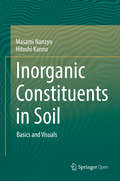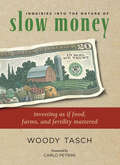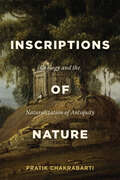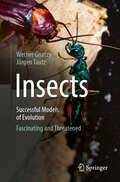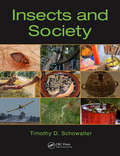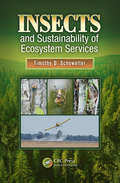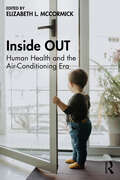- Table View
- List View
Innovative Trend Methodologies in Science and Engineering
by Zekâi ŞenThis book covers all types of literature on existing trend analysis approaches, but more than 60% of the methodologies are developed here and some of them are reflected to scientific literature and others are also innovative versions, modifications or improvements. The suggested methodologies help to design, develop, manage and deliver scientific applications and training to meet the needs of interested staff in companies, industries and universities including students.Technical content and expertise are also provided from different theoretical and especially active roles in the design, development and delivery of science in particular and economics and business in general. It is also ensured that, wherever possible and technically appropriate, priority is given to the inclusion and integration of real life data, examples and processes within the book content.The time seems right, because available books just focus on special sectors (fashion, social, business). This book reviews all the available trend approaches in the present literature on rational and logical bases.
Inorganic Constituents in Soil: Basics and Visuals
by Masami Nanzyo Hitoshi KannoThis open access book is a must-read for students of and beginners in soil science. In a well-organized and easy-to-follow manner, it provides basic outlines of soil minerals, new methods and recent developments in the field, with a special focus on visual aids. The chapters on primary minerals, secondary minerals, non-crystalline inorganic constituents and inorganic constituents sensitive to varying redox conditions will help readers understand the basic components of soils. Further, readers are introduced to new analytical methods with the aid of microscopy and recent developments in the field. Uniquely, the book features case studies on the identification and isolation methods for vivianite crystals from paddy field soils, as well as a useful procedure for identifying noncrystalline constituents such as volcanic glasses and plant opals, which can also be applied to other soils depending on the local conditions.Given its focus and coverage, the book will be useful to all readers who are interested in agronomy, plant production science, agricultural chemistry and environmental science. In addition, it can help biogeochemists further expand their research work on the rhizosphere of wetland plant roots, iron and phosphate dynamics, etc.
Inorganic Materials for Energy, Medicine and Environmental Remediation (Environmental Chemistry for a Sustainable World #69)
by Eric Lichtfouse Mu. Naushad Saravanan Rajendran Dai-Viet N. VoThis book presents concepts, methods and applications of inorganic nanomaterials for energy applications such as fuel cells and batteries, for environmental applications such as water purification, and for medicinal applications such as cancer treatments. The founding father of nanotechnology, Eric Drexler, always communicated a unique vision in exploring new materials and creating advancements in molecular nanotechnology. He emphasized the potential advantages of smaller size, higher efficiency and less needed resources for applications in energy, environment and medicine. A higher surface to volume ratio of inorganic nanomaterials is a key property.
Inquiries into the Nature of Slow Money: Investing as if Food, Farms, and Fertility Mattered
by Woody TaschCould there ever be an alternative stock exchange dedicated to slow, small, and local? Could a million American families get their food from CSAs? What if you had to invest 50 percent of your assets within 50 miles of where you live?Such questions—at the heart of slow money—represent the first steps on our path to a new economy.Inquiries into the Nature of Slow Money presents an essential new strategy for investing in local food systems and introduces a group of fiduciary activists who are exploring what should come after industrial finance and industrial agriculture. Theirs is a vision for investing that puts soil fertility into return-on-investment calculations and serves people and place as much at it serves industry sectors and markets.Leading the charge is Woody Tasch-whose decades of work as a venture capitalist, foundation treasurer, and entrepreneur now shed new light on a truer, more beautiful, more prudent kind of fiduciary responsibility. He offers an alternative vision to the dusty old industrial concepts of the nineteenth and twentieth centuries when dollars, and the businesses they financed, lost their connection to place; slow money, on the other hand, is firmly rooted in the new economic, social, and environmental realities of the 21st century.Inquiries into the Nature of Slow Money is a call to action for designing capital markets built around not extraction and consumption but preservation and restoration. Is it a movement or is it an investment strategy? Yes.
Inquiry Science Teaching: A Fire to be Kindled
by Stephen DeMeoThe notion of Inquiry is often difficult for a science teacher to get a handle on. What is it exactly? And how can a teacher perform an inquiry lesson? This book begins by exploring this concept, then challenges the reader in an unconventional manner to take a stand about how they teach science. Step by step instructions are given to help the novice as well as the experienced middle and high school teacher to effectively conduct inquiry lessons. This book is linked to over six hours of video - providing teachers with model inquiry lessons in biology, chemistry, physics and earth science. Additionally, video-based evaluative guidelines are included to help teachers reflect on their instruction and improve how they conduct inquiry lessons. Coupling a clearly articulated process of doing inquiry, with video and self-assessment, science teachers will be empowered to take their instruction to the next level, and by so doing facilitate their students' understanding of science.
Ins Feld und zurück - Praktische Probleme qualitativer Forschung in der Sozialgeographie
by Frank Meyer Judith Miggelbrink Kristine BeurskensIn diesem Buch berichten 20 Wissenschaftler/innen aus ihren praktischen Erfahrungen in der Feldforschung im Bereich der Sozialgeographie. Im Einzelnen gehen sie auf die Herausforderungen bei der Konzeption, im Prozess der Durchführung und im Nachgang von Datenerhebungen ein. Sie diskutieren zeitliche, inhaltliche und organisatorische Aspekte und beleuchten, wie Entscheidungen im Feld Erfolg und Misserfolg von Forschung maßgeblich prägen. Ihre Erlebnisse an diversen Orten wie Mittel- und Osteuropa, den Steppen Kasachstans sowie in schrumpfenden Regionen oder in ostdeutschen Jugendklubs bilden die Grundlage für Reflexionen über schwierige Entscheidungen im Feld. Zudem diskutieren sie den Umgang mit sich ändernden Forschungsfragen, widerspenstigen Journalist/inn/en und aufkommenden Shitstorms. Das Buch richtet sich an Nachwuchswissenschaftler/innen, die im Vorfeld ihrer ersten Feldforschungen mit Problemen konfrontiert werden, die zumeist von Methodenhandbüchern nicht berücksichtigt werden.
Inscriptions of Nature: Geology and the Naturalization of Antiquity
by Pratik ChakrabartiLearn how the deep history of nature became a dominant paradigm of historical thinking, through a study of landscapes of India.In the nineteenth century, teams of men began digging the earth like never before. Sometimes this digging—often for sewage, transport, or minerals—revealed human remains. Other times, archaeological excavation of ancient cities unearthed prehistoric fossils, while excavations for irrigation canals revealed buried cities. Concurrently, geologists, ethnologists, archaeologists, and missionaries were also digging into ancient texts and genealogies and delving into the lives and bodies of indigenous populations, their myths, legends, and pasts. One pursuit was intertwined with another in this encounter with the earth and its inhabitants—past, present, and future. In Inscriptions of Nature, Pratik Chakrabarti argues that, in both the real and the metaphorical digging of the earth, the deep history of nature, landscape, and people became indelibly inscribed in the study and imagination of antiquity. The first book to situate deep history as an expression of political, economic, and cultural power, this volume shows that it is complicit in the European and colonial appropriation of global nature, commodities, temporalities, and myths. The book also provides a new interpretation of the relationship between nature and history. Arguing that the deep history of the earth became pervasive within historical imaginations of monuments, communities, and territories in the nineteenth century, Chakrabarti studies these processes in the Indian subcontinent, from the banks of the Yamuna and Ganga rivers to the Himalayas to the deep ravines and forests of central India. He also examines associated themes of Hindu antiquarianism, sacred geographies, and tribal aboriginality. Based on extensive archival research, the book provides insights into state formation, mining of natural resources, and the creation of national topographies. Driven by the geological imagination of India as well as its landscape, people, past, and destiny, Inscriptions of Nature reveals how human evolution, myths, aboriginality, and colonial state formation fundamentally defined Indian antiquity.
Insect Bioecology and Nutrition for Integrated Pest Management
by Antônio R. Panizzi José R. P. ParraThe field of insect nutritional ecology has been defined by how insects deal with nutritional and non-nutritional compounds, and how these compounds influence their biology in evolutionary time. In contrast, Insect Bioecology and Nutrition for Integrated Pest Management presents these entomological concepts within the framework of integrated pest m
Insect Conservation and Australia’s Grasslands
by Tim R. NewAustralia’s varied grasslands have suffered massive losses and changes since European settlement, and those changes continue under increasingly intensive human pressures for development and agricultural production. The values of native grasslands for conservation of endemic native biodiversity, both flora and fauna, have led to strong interests in the protection of remaining fragments, especially near urban centres, and documentation of the insects and other inhabitants of grasslands spanning tropical to cool temperate parts of the country. Attention to conservation of grassland insects in Australia is relatively recent, but it is increasingly apparent that grasslands harbour many localised and ecologically specialised endemic species. Their conservation necessarily advances from very incomplete documentation, and draws heavily on lessons from the far better-documented grasslands elsewhere, most notably in the northern hemisphere, and undertaken over far longer periods. From those cases, and the extensive background to grassland management to harmonise conservation with production and amenity values through honing use of processes such as grazing, mowing and fire, the needs and priorities for Australia can become clearer, together with needs for grassland restoration at a variety of scales. This book is a broad overview of conservation needs of grassland insects in Australia, drawing on the background provided elsewhere in the world on the responses to disturbances, and the ecological importance, of some key insect groups (notably Orthoptera, Hemiptera and Lepidoptera) to suggest how insect conservation in native, pastoral and urban grasslands may be advanced. The substantial references given for each chapter facilitate entry for non-entomologist grassland managers and stewards to appreciate the diversity and importance of Australia’s grassland insects, their vulnerabilities to changes, and the possibilities for conserving them and the wider ecological roles in which they participate.
Insect Conservation in Australia: Why and How
by Tim R. NewThe fundamental ecological, cultural and economic roles of insects give them central importance in functioning of terrestrial and inland water ecosystems worldwide. Insect declines, from a variety of anthropogenic threats, erode these services and dictate the need for insect conservation, but the consequences of insect losses are poorly recognised. In Australia, insect conservation must proceed from a very uncertain and incomplete knowledge of insect identifications and diversity, and also from a generally poor public appreciation of their central ecological roles and relevance to human welfare and other biota. These impediments occupy much of this book, in which cases of insect conservation across the world are used to provide lessons for Australia, where a combination of large numbers of insect species and small numbers of entomologists and citizen participants necessitates clear appreciation of insect importance, and focussed conservation priorities. Low public sympathy and inadequate scientific information can hinder progress because uncertainty, imprecision and ignorance are difficult to explain to policymakers and funding agencies whose interest and support may be pivotal. Understanding and overcoming those impediments is a vital component of insect conservation. This book is intended as an introduction to the needs, rationale and practice of insect conservation in Australia for students in conservation biology, managers and other concerned people who are not specialists in entomology, to whom the daunting variety and complexity of insect life may deter involvement, and for whom an Appendix aid to recognising insect orders is included. The text is based on conservation needs of Australia’s insects and shows how progress necessitates effective communication, clear priorities, and plans for action within a realistic and practical framework of aims and needs for practical conservation. A suggested ‘Agenda’ for advancing insect conservation in Australia encompasses many of these needs and activities.
Insect Conservation: Past, Present and Prospects
by Tim R. NewThe history of interest and practice in insect conservation is summarised and traced through contributions from many of the leaders in the discipline, to provide the first broad global account of how insects have become incorporated into considerations of conservation. The essays collectively cover the genesis and development of insect conservation, emphasising its strong foundation within the northern temperate regions and the contrasts with much of the rest of the world. Major present-day scenarios are discussed, together with possible developments and priorities in insect conservation for the future.
Insect Decline and Conservation in the Neotropics
by Jorge L. León-Cortés Alex Córdoba-AguilarThis book provides for the first time an integrative analysis of the major drivers of decline and threats of insects and related arthropods in the Neotropical region. Thus, it is an urgent first step towards filling an information gap in this region. It identifies the main causes of decline, provides and discusses examples from the better-studied insect faunas to develop and advance principles and practical conservation management for the rich Neotropical insect faunas. The book is aimed at students, naturalists, environmental managers, and others who have training in entomology/insect ecology and can apply the results of surveys of key insect faunas to assess their vulnerability to environmental change and establish guidelines for their conservation.
Insect Diversity, Declines and Conservation in Australia (Fascinating Life Sciences)
by Tim R. NewProblems of insect enumeration and assessment of needs are addressed in the contexts of rapid and substantial losses and changes to all key Australian terrestrial and freshwater environments and promoting awarenesss of the importance of insects. Further definition of the insect fauna and its peculiarities can aid threat alleviation and practical management to protect and conserve this unique and largely endemic biodiversity. Written for the many environmental managers and naturalists who are not primarily entomologists, the ten chapters expand from considerations of insect decline and diversity to the unique features of the Australian fauna and its characterisation. Cases and examples from throughout the world illustrate the major needs, approaches and priorities to sustaining a poorly known, diverse and ecologically varied insect heritage of global significance.
Insect conservation and Australia’s Inland Waters
by Tim R. NewThe first broad overview of conservation needs of Australia’s largely endemic freshwater insects, drawing on examples and information from many parts of the world to illustrate and develop needs and practical prospects for conservation in inland water environments. The wide variety of those environments in Australia and their diverse insect inhabitants – many of them highly localised and ecologically specialised and vulnerable - and threats to them is illustrated. Case histories demonstrate the different aspects of practical conservation management that may be possible in different contexts, and numerous references facilitate understanding by non-specialist readers and non-entomologist conservation managers and practitioners.
Insects (Seymour Simon Science Ser.)
by Seymour SimonAward-winning science writer Seymour Simon explores the wonderful world of insects, with fascinating facts and stunning full-color photographs, in his latest nonfiction picture book. Readers will learn all about insects’ life stages, senses, bodies, and the many different kinds, including beetles, ladybugs, bees, butterflies, and more! This nonfiction picture book is an excellent choice to share during homeschooling, in particular for children ages 6 to 8. It’s a fun way to learn to read and as a supplement for activity books for children.This updated edition includes:Stunning full-color photographsGlossaryIndexWebsite and additional reading sourcesSupports the Common Core Learning Standards, Next Generation Science Standards, and the Science, Technology, Engineering, and Math (STEM) standards
Insects - Successful Models of Evolution: Fascinating and Threatened
by Jürgen Tautz Werner GnatzyIn the course of evolution, insects have developed an almost unbelievable variety of shapes and functional sophistication. The design of their exoskeleton is so imaginative and unusual, often even bizarre, that one can only marvel. The fact that insects can find design solutions for any problem, no matter how special, makes them extremely successful. They have thus become crucial links in the complex networks of nature. Impressive macro photographs and informative scanning electron-optical images provide an insight into the wealth of forms, beauty and function of the six-legged creatures. Fascinating texts accompany the pictures and explain, among other things, how the great diving beetle uses vertebrate hormones as knock-out drops when attacked by fish, the pine moth beetle locates distant forest fires, the bombardier beetle emits pulsed explosions with its firing apparatus or the blue butterfly caterpillar glamours ants. Insects play a crucial role in the ecosystems of our planet. Man-made environmental destruction is interfering with these cycles in a sensitive way. This endangers the survival of insects, with dramatic consequences for us humans as well.
Insects and Society
by Timothy D. Schowalter"Insects are the most species-rich and important organisms on earth, and that’s why there are many university courses dedicated to the topic of Insects and Society. But, surprisingly, this is the first textbook specifically created for those courses. The content in this textbook is not only ideal for introductory courses, but it also is great for K12 instructors, insatiably curious children, and indeed anyone fascinated by insects and their impact on people." – Robert K. D. Peterson, Ph.D., Professor of Entomology, Montana State University and Past President, Entomological Society of America "Society is undervaluing the role of insects as pivotal drivers of ecosystem functioning and services. Addressing this deficit is a major merit of this book." – Teja Tscharntke, Professor and Head of the Agroecology Research Group at the University of Göttingen, Germany Insects are all around us, outweighing humanity by 17 times. Many are nuisances; they compete with us for food and carry some of our most devastating diseases. Many common pests have been transported worldwide by humans. Yet, some recent reports suggest dramatic declines in some important groups, such as pollinators and detritivores. Should we care? Yes, we should. Without insect pollinators we’d lose 35% of our global food production; without detritivores, we would be buried in un-decayed refuse. Insects are also critical sources for nutritional, medical and industrial products. A world without insects would seem a very different and unpleasant place. So why do insects inspire such fear and loathing? This concise, full-color text challenges many entrenched perceptions about insect effects on our lives. Beginning with a summary of insect biology and ecology that affect their interactions with other organisms, it goes on to describe the various positive and negative ways in which insects and humans interact. The final chapters describe factors that affect insect abundance and approaches to managing insects that balance their impacts. The first textbook to cater directly to those studying Insect and Society or Insect Ecology modules, this book will also be fascinating reading for anyone interested in learning how insects affect human affairs and in applying more sustainable approaches to "managing" insects. This includes K-12 teachers, undergraduate students, amateur entomologists, conservation practitioners, environmentalists, as well as natural resource managers, land use planners and environmental policy makers.
Insects and Sustainability of Ecosystem Services (Social Environmental Sustainability)
by Timothy D. SchowalterWith few exceptions, insects are perceived in industrialized countries as undesirable pests. In reality, relatively few insects interfere with us or our resources. Most have benign or positive effects on ecosystem services, and many represent useful resources in non-industrialized countries. Challenging traditional perceptions of the value of insec
Insects, Fire and Conservation
by Tim R. NewA global synthesis of the impacts of wildfires and controlled burning on insects, bringing together much hitherto scattered information to provide a guide to improved conservation management practice. The great variety of responses by insect species and assemblages demonstrates the often subtle balance between fire being a severe threat and a vital management component. Examples from many parts of the world and from diverse biotopes and production systems display the increasingly detailed appreciation of fire impacts on insects in terrestrial and freshwater environments and the ways in which prescribed burning may be tailored to reduce harmful ecological impacts and incorporated into protocols for threatened species and wider insect conservation benefits.
Inselwelten: Eine kulturgeographische Erkundung
by Werner KreiselInseln haben nicht nur Wissenschaft und Kunst, sondern die gesamte Menschheit seit jeher fasziniert. Sie regen die Phantasie an und erwecken die Sehnsucht nach Ferne, Fremde und Exotik. Auch die Tourismusbranche hat das lange erkannt und stellt das romantische Inselgefühl ins Zentrum ihrer Werbung für Traumurlaube im „Paradies“. Große Denker haben ihre Überlegungen zu einem idealen Staatswesen an entlegenen, utopischen Inseln festgemacht. Um viele Inseln ranken sich Sagen und Legenden. Doch sind Inseln mehr als Urlaubsträume und Fiktionen: Manche sind Standort von Hochkulturen, andere wurden zu internationalen Finanzplätzen, wieder andere zu kriminellen Steueroasen. Inseln spielten eine entscheidende Rolle für Entdeckungsfahrten, sie schufen die Motivation für richtungsweisende wissenschaftliche Erkenntnisse, wie die Evolutionstheorie. Inseln waren und sind immer bei geostrategischen Konfrontationen beteiligt und blieben auch von innenpolitischen Konflikten nicht verschont. Für viele Flüchtlinge sind Inseln oft die ersten sicheren Anlaufstellen nach einer gefährlichen Seefahrt. Und gleichzeitig dienen Inseln seit jeher als Exil oder Gefängnis, vor allem, wenn sie so „isoliert“ waren, dass eine Flucht unmöglich schien. Eigentlich sind Inseln „nur“ von Wasser umgebenes Land. Doch der Begriff kann auch auf Sprach- und Kulturinseln, auf ethnisch oder sozial segregierte Wohngebiete sowie religiös geprägte „Inseln der Meditation“ ausgeweitet werden. Das vorliegende Buch versteht sich als eine „kulturgeographische Erkundung“: Es wählt diejenigen kulturellen, gesellschaftlichen und politischen Aspekte aus, die am Beispiel von Inseln besonders gut veranschaulicht werden können. Das Buch richtet sich nicht nur an wissenschaftlich interessierte Leserinnen und Leser, sondern auch an Menschen, die aus eigener Erfahrung eine besondere Beziehung zu Inseln haben. Auch für potenzielle Inselbesucherinnen und -besucher, die sich intensiver mit der Thematik auseinandersetzen wollen, ist dieses Buch gedacht. Schließlich sollen die Leserinnen und Leser auch dazu ermuntert werden, sich aus ihren eigenen Blickwinkeln selbständig weiterführende Gedanken zum Thema „Inselwelten“ zu machen.
Inside Animal Hearts and Minds: Bears That Count, Goats That Surf, and Other True Stories of Animal Intelligence and Emotion
by Jonathan Balcombe Belinda RecioAs Charles Darwin suggested more than a century ago, the differences between animals and humans are "of degree and not of kind.” Not long ago, ethologists denied that animals had emotions or true intelligence. Now, we know that rats laugh when tickled, magpies mourn as they cover the departed with greenery, female whales travel thousands of miles for annual reunions with their gal pals, seals navigate by the stars, bears hum when happy, and crows slide down snowy rooftops for fun.In engaging text, photographs, and infographics, Inside Animal Hearts and Minds showcases fascinating and heart-warming examples of animal emotion and cognition that will foster wonder and empathy. Learn about an orangutan who does “macramé,” monkeys that understand the concept of money, and rats that choose friendship over food. Even language, math, and logic are no longer exclusive to humans. Prairie dogs have their own complex vocabularies to describe human intruders, parrots name their chicks, sea lions appear capable of deductive thinking akin to a ten-year-old child’s, and bears, lemurs, parrots, and other animals demonstrate numerical cognition.In a world where a growing body of scientific research is closing the gap between the human and non-human, Inside Animal Hearts and Minds invites us to change the way we view animals, the world, and our place in it.
Inside Biosphere 2: Earth Science Under Glass (Scientists in the Field Series)
by Mary Kay Carson Tom UhlmanIn the Arizona desert, scientists conduct studies and experiments aimed to help us better understand our environment and what sort of things are happening to it due to climate change. The location is Biosphere 2, an immense structure that contains a replica ocean, savannah, and rainforest, among other Earth biomes. It's a unique take on the Scientists in the Field mission statement -- in this case, the lab is a replica that allows the scientists to conduct large-scale experiments that would otherwise be impossible.
Inside Interesting Integrals: A Collection of Sneaky Tricks, Sly Substitutions, and Numerous Other Stupendously Clever, Awesomely Wicked, and Devilishly Seductive Maneuvers for Computing Hundreds of Perplexing Definite Integrals From Physics, Engineering, and Mathematics (Plus Numerous Challenge Problems with Complete, Detailed Solutions) (Undergraduate Lecture Notes in Physics)
by Paul J. NahinWhat’s the point of calculating definite integrals since you can’t possibly do them all?What makes doing the specific integrals in this book of value aren’t the specific answers we’ll obtain, but rather the methods we’ll use in obtaining those answers; methods you can use for evaluating the integrals you will encounter in the future.This book, now in its second edition, is written in a light-hearted manner for students who have completed the first year of college or high school AP calculus and have just a bit of exposure to the concept of a differential equation. Every result is fully derived. If you are fascinated by definite integrals, then this is a book for you. New material in the second edition includes 25 new challenge problems and solutions, 25 new worked examples, simplified derivations, and additional historical discussion.
Inside OUT: Human Health and the Air-Conditioning Era
by Elizabeth L. McCormickInside OUT: Human Health and the Air-Conditioning Era focuses on the enclosed environment of fully conditioned buildings, revealing a unique ecosystem with broad implications for human life and a rapidly expanding global footprint. Emphasizing the interconnections between buildings and human health, equity, and environmental sustainability, it presents an interdisciplinary, holistic analysis of the social, behavioral, and technological issues of indoor space.Over the 20th century, advances in mechanical conditioning technologies led to the dispersion and international dominance of the sealed building envelope, which casually and progressively disconnected buildings and their occupants from local climatic, biological, and cultural environments. At the same time, humans were increasingly pushed indoors by less tangible, socially constructed forces that associated climate control with cleanliness, health, social status, and modernization.In this volume, a multi-disciplinary group of experts on the indoor microbiome from the fields of biology, anthropology, and architecture come together to thoughtfully reflect on the history, properties, and meaning of indoor air quality in buildings, and to discuss the future of human habitation – with a dominant focus on human health in a post-pandemic world. Taking a human-first approach to health and sustainability, the authors weave together a compelling analysis of social and technological drivers of conditioned space with arguments for future interventions in the built environment.Amid growing awareness of air quality and climate concerns, Inside OUT provides a timely discussion of the relationship between building design and human health, of relevance to professional and academic readers from across the spectrum of the building industry, as well as fields including public health and environmental studies.
Inside Smart Cities: Place, Politics and Urban Innovation
by Federico Caprotti Andrew Karvonen Federico CugurulloThe era of the smart city has arrived. Only a decade ago, the promise of optimising urban services through the widespread application of information and communication technologies was largely a techno-utopian fantasy. Today, smart urbanisation is occurring via urban projects, policies and visions in hundreds of cities around the globe. Inside Smart Cities provides real-world evidence on how local authorities, small and medium enterprises, corporations, utility providers and civil society groups are creating smart cities at the neighbourhood, city and regional scales. Twenty three empirically detailed case studies from the Global North and South – ranging from Cape Town, Stockholm and Abu Dhabi to Philadelphia, Hong Kong and Santiago – illustrate the multiple and diverse incarnations of smart urbanism. The contributors draw on ideas from urban studies, geography, urban planning, science and technology studies and innovation studies to go beyond the rhetoric of technological innovation and reveal the political, social and physical implications of digitalising the built environment. Collectively, the practices of smart urbanism raise fundamental questions about the sustainability, liveability and resilience of cities in the future. The findings are relevant to academics, students, practitioners and urban stakeholders who are questioning how urban innovation relates to politics and place.

